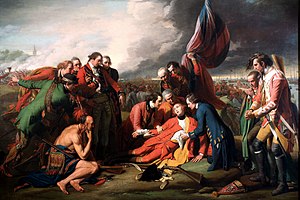
Back معركة سهول أبراهام Arabic Batalla de les Llanures d'Abraham AST Битка на Авраамови поля Bulgarian Batalla de les Planes d'Abraham Catalan Bitva na Abrahamových pláních Czech Schlacht auf der Abraham-Ebene German Batalo de la Ebenaĵoj de Abrahamo Esperanto Batalla de las Llanuras de Abraham Spanish Quebecin taistelu (1759) Finnish Bataille des Plaines d'Abraham French
| Battle of the Plains of Abraham | |||||||
|---|---|---|---|---|---|---|---|
| Part of the French and Indian War | |||||||
 The Death of General Wolfe, Benjamin West | |||||||
| |||||||
| Belligerents | |||||||
|
|
Mi'kmaq Maliseet Abenaki Potawatomis Odawa Wendat | ||||||
| Commanders and leaders | |||||||
|
|
| ||||||
| Strength | |||||||
| 4,400 regulars and colonial rangers[1] |
3,400 men[2] 1,900 regulars 1,500 colonial militia and natives | ||||||
| Casualties and losses | |||||||
|
58 killed 600 wounded[1] |
116 killed 600 wounded[2] 350 captured[3] | ||||||
Location within Quebec | |||||||
The Battle of the Plains of Abraham, also known as the Battle of Quebec (French: Bataille des Plaines d'Abraham, Première bataille de Québec), was a pivotal battle in the Seven Years' War (referred to as the French and Indian War to describe the North American theatre). The battle, which began on 13 September 1759, was fought on a plateau by the British Army and Royal Navy against the French Army, just outside the walls of Quebec City on land that was originally owned by a farmer named Abraham Martin, hence the name of the battle. The battle involved fewer than 10,000 troops in total, but proved to be a deciding moment in the conflict between France and Britain over the fate of New France, influencing the later creation of Canada.[4]
The culmination of a three-month siege by the British, the battle lasted about an hour. British troops commanded by General James Wolfe successfully resisted the column advance of French troops and Canadian militia under General Louis-Joseph, Marquis de Montcalm, employing new tactics that proved extremely effective against standard military formations used in most large European conflicts. Both generals were mortally wounded during the battle; Wolfe died of gunshot wounds just as the French began to retreat and Montcalm died the next morning after receiving a musket ball wound just below his ribs. In the wake of the battle, the French evacuated the city.
The French forces would attempt to recapture Quebec the following spring, and in the Battle of Sainte-Foy, they forced the British to retreat within the walls. However, the French failed to take the city and in 1763, following defeat in the Montreal campaign, France ceded most of its possessions in eastern North America to Great Britain in the Treaty of Paris.
The decisive success of the British forces on the Plains of Abraham and the subsequent capture of Quebec became part of what was known in Great Britain as the "Annus Mirabilis" of 1759.
- ^ a b Macleod p 230
- ^ a b Macleod p. 228
- ^ Snow 2009, pp. 385–386
- ^ "Battle of Quebec". 2007. Archived from the original on 18 December 2008.
